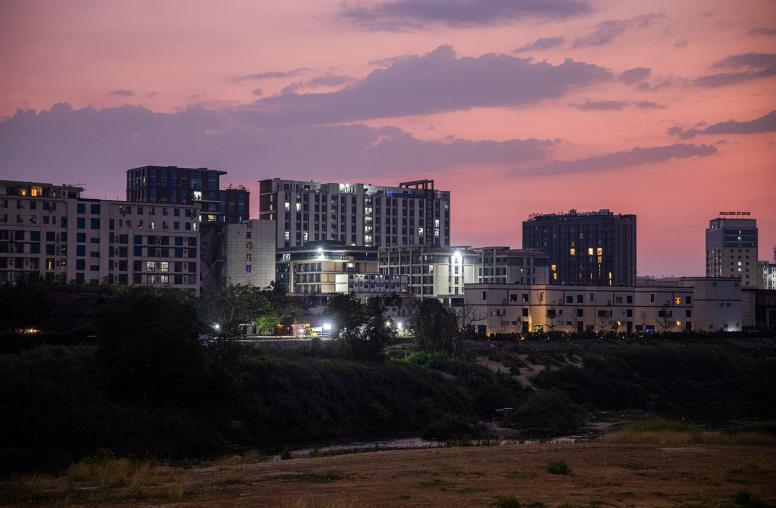In Latin America, the U.S. Should Put Democratic Partnerships Front and Center
To advance democracy in the region, Washington should cultivate its relationships with regional democratic stalwarts, like Costa Rica.
One of the most sage and skilled diplomats of the last century, the late Secretary of State George Shultz, used the analogy of a “garden” to describe the essential work of quiet statecraft. A healthy garden needs constant care and tending, he would say, as validation of the importance of sitting down with friends on a regular basis to discuss trends and developments in the absence of crisis flashpoints. This is exactly the type of approach that Costa Rica has warranted because of its strong commitment to democratic governance.

When Costa Rican President Rodrigo Chaves Robles comes to Washington next week, he will be representing a peaceful, stable, democratic outlier in a region that has been wracked by ideological swings: from military juntas to Soviet-inspired revolutionary movements, from the neoliberal Washington consensus to Hugo Chavez’ pink tide and now on to more recent authoritarian populism. All the while, Costa Rica has remained a stalwart in the democratic governance column, a fact that should be celebrated. But more importantly it deserves to be cultivated like the precious flower it is in order to advance democracy in the region.
Recent Developments Provide Hope for Democracy in the Hemisphere
The past weeks have given Washington a few rare flashes of optimism amid many negative trend lines in the region. In drug cartel-plagued Ecuador, citizens voted peacefully last week, following a violent campaign, which saw two candidates assassinated and a third evading an attempted hit. Two candidates emerged as the top vote getters and the country will head to a constitutionally prescribed second round of voting to elect its new leader in October. Ecuador deserves the hemispheric solidarity of fellow democrats to support the consolidation of its new government and to begin to take back its streets from violent drug cartels.
Similarly, in Guatemala last week, citizens voted overwhelmingly for a little-known candidate from a party with few resources and no representation, but with an inspiringly powerful anti-corruption message that resonated with Guatemalans across the electorate. Bernardo Arévalo surprised many across the Americas, as he overcame underhanded judicial challenges to his candidacy and a powerful cabal of corrupt industrialists who have long colluded behind the scenes to dominate Guatemalan politics.
While no one should underestimate the entrenched interests that will conspire against Arévalo’s efforts at democratic transparency and reform, this work must be supported by the community of hemispheric landscapers in the garden of democracy. To its credit, the Biden administration issued timely, supportive statements from the president, vice president and secretary of state. In the arcane world of diplomatic communications, that is the trifecta of public support and a winning ticket. Now that vocal support must be turned into practical support. And this is where a chat between Presidents Chaves and Biden can come in handy.
Alliance for Development in Democracy
No one questions the sheer power asymmetry between the United States and Costa Rica. Militarily, economically and in a geostrategic sense, they are David and Goliath. But diplomatically, the good offices of an activist Costa Rica, a brother Central American Republic to Guatemala, could be enormously helpful. Absent the often-unhelpful vestigial trappings of American imperialism in the region, Costa Rica could spearhead a group of friends to support Guatemala, very similar to its founding engagement with Panama and the Dominican Republic in the Alliance for Development in Democracy (ADD).
Efforts like the ADD allow a small nation to “punch above its weight” in regional affairs. Costa Rica’s admirable human rights traditions lend it an air of authority in fora such as the Organization of American States and the United Nations. Costa Rican prison administrators, recognized as professional and observant of human rights, might be enlisted to help a new Ecuadoran government get hold of its notoriously corrupt and permissive penitentiary system, which has become a veritable command cell for narco-activity.
Costa Rica, like the United States, is a migrant receiving nation, absorbing much of the outflow of Nicaraguans trying to escape the horror of the Ortega dictatorship next door in Nicaragua. The attendant drag on social services, crime and security are issues Chaves deals with daily, like Biden. The scale may be different, but the essential push-pull factors are the same.
When U.S. presidents sit down with their Latin and Caribbean counterparts, the discussions are overwhelmingly focused on bilateral issues. In general, the Latin American leaders arrive with a list of complaints or “asks,” and the U.S. president engages with State Department- and National Security Council-drafted talking points. But in Costa Rica’s case, that list of bilateral friction points is mercifully short, so we can expect no breakthroughs or “frank” discussions with a “frenemy” from this gathering. In fact, it’s likely to be an under-the-radar visit as far as presidential tête-à-têtes go.
One key agenda item should be how the United States can provide Costa Rica, and the region more broadly, with the practical support I mentioned above. Such support could include:
- The United States could fund a political party incubator in San Jose, Costa Rica that trains Latin American politicians and party figures. U.S. organizations like the National Democratic Institute and the International Republican Institute and Germany’s Konrad Adenauer Foundation have decades of experience doing this type of work and could be a great resource.
- Washington could also increase its assistance to the Inter-American Court of Human Rights to provide it with the resources to finish investigations into human rights abuses.
- Another idea would be to establish a migration and anti-trafficking operation in San Jose — with investigators and prosecutors detailed from around the region — focused on humanitarian care for migrants and the prosecution of trafficking networks.
These types of initiatives and support would help highlight the centrality of Costa Rica’s democracy in the region.
In the garden of diplomatic engagement, the two leaders will have an all-too-rare chance to honestly discuss the state of hemispheric democracy from the perspective of a non-crisis situation. Biden’s own humility about the challenges to U.S. democracy is a welcome admission that contributes to his credibility with Latinos. With his Costa Rican counterpart, Biden need not be defensive or didactic; he can be sincerely collaborative in the search for ways to make democracy more resilient. George Schultz would be more than pleased.
John Feeley is the executive director of the Center for Media Integrity of the Americas and a retired U.S. ambassador.



